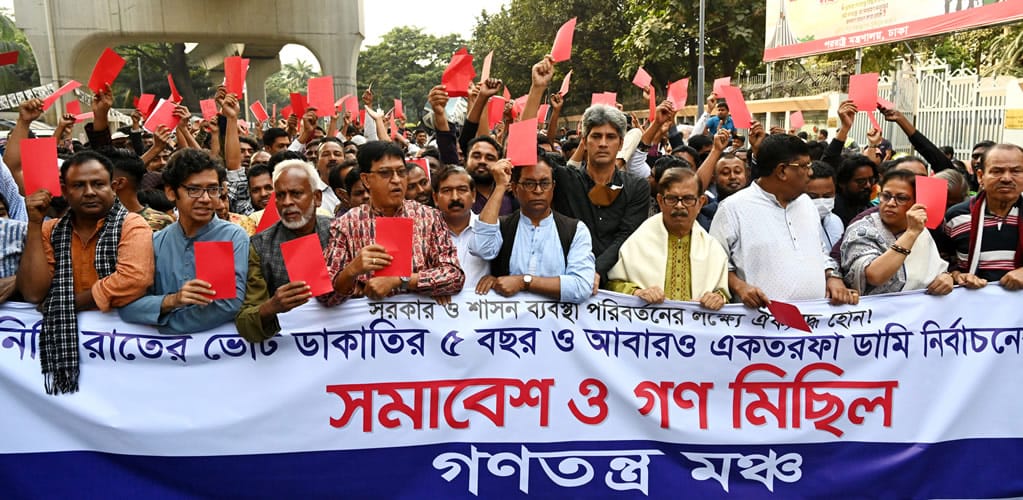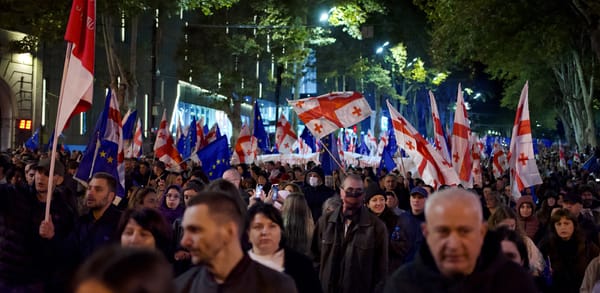Bangladesh polls no longer make ‘battle of the begums’ headlines and that’s sad
Bangladesh’s 2024 election resulted in PM Sheikh Hasina’s anticipated win, as the main opposition boycotted, alleging a sham to maintain ruling party dominance and raising concerns about democratic decline, underscoring global challenges to democracy in the year ahead.

Bangladesh’s 2024 election resulted in PM Sheikh Hasina’s anticipated win, as the main opposition boycotted, alleging a sham to maintain ruling party dominance and raising concerns about democratic decline, underscoring global challenges to democracy in the year ahead.
O ne week into the new year, the first election of 2024. Bangladesh. Sunday, January 7.
Without any surprise, Prime Minister Sheikh Hasina and her Awami League (AL) were always expected to win a fourth term. How could she not, with the main opposition Bangladesh National Party (BNP) boycotting the whole thing as a charade?
The BNP alleges that the very process of having an election in Bangladesh in 2024 is an elaborate sham, which accomplishes two things:
- It allows the AL to stay in power, which is what it truly, madly, deeply wants and will do/has done everything to this end in the past 15 years.
- And it allows foreigners who matter (India, China, and somewhat unwillingly, the US) to pretend Bangladesh is not really sliding into irreversible democratic decline 53 years after it became an independent country.
Some, particularly the AL, accuse the BNP of unhealthy and toxic levels of cynicism. They have a point. Being the long-term opposition in Bangladesh can be an embittering business.
That said, the BNP also has a point. Although 29 political parties, including the governing AL, fought the elections, almost all opposition parties led by the BNP and the Jamaat-e-Islami (Jamaat) sat it out.
Once upon a time, elections in Bangladesh made for ‘battle of the begums’ headlines, to indicate that Sheikh Hasina and her arch-rival, BNP leader Begum Khaleda Zia were duking it out. Now, they were a practically one-party affair, in the sense that only one entity could run and win and form a government.

— Bangladeshi security personnel carrying polling materials outside a distributing centre in Dhaka, Bangladesh.
The BNP said that the AL’s anti-democratic domination of the political space made another term a fait accompli and the sham elections process should have been denounced outright by everyone who’s anyone.
Heard any outrage about that?
Not from Beijing or New Delhi.

— Bangladesh.
China has said it backs the election process. Days before the January 7 ballot, China’s ambassador in Dhaka, Yao Wen, said: “We hope that it will be held successfully. It will be a milestone for the democratic process of Bangladesh.”
India says, “the election in Bangladesh is the domestic affair of Bangladesh.”
The equanimity of both Asian giants is striking.

— Activists of the Left Democratic Alliance wearing black cloths over their mouth stageing a protest rally against the unconstitutional ban on political meetings until the end of the general election.
India is keen not to strengthen the BNP, which with the Jamaat makes for a tilt towards political Islamism. The AL government in Dhaka has also taken pains to reassure India that it is aware of its sensitivities about China; that it regards China as more of a development partner rather than a strategic one, and that Bangladesh will never forget China and the US’s unhelpful role during its 1971 liberation struggle and the fact that India came to its aid.
Meanwhile, China is betting on a newly reelected AL government ensuring a predictable political climate and protecting its infrastructure investments in Bangladesh.
What of the US?
It has tried to raise issues to do with the undermining of democracy and human rights.
According to Sourabh Sen in Al Jazeera, in December 2021, US Secretary of State Antony Blinken imposed sanctions on two Bangladeshi security officials for alleged extrajudicial killings. The US Treasury also identified Bangladesh’s elite Rapid Action Battalion and some officials under the Global Magnitsky Sanctions Program in connection with serious human rights abuse. And in May 2023, Mr Sen wrote, the US government enacted a visa policy which denied visas to those engaged in undermining the “democratic election process”.
PMP XTRA | What is the Global Magnitsky Sanctions Program?
“This sanctions program, which targets those connected to serious human rights abuse, corrupt actors, and their enablers, represents the best of the United States’ values and enduring commitment to promote respect for human rights and combat corruption around the world.”
“The Global Magnitsky Act of 2016 within the NDAA 2017 authorizes the U.S. government to sanction those foreign government officials worldwide that are human rights offenders, freeze their assets, and ban them from entering the U.S.”
In September 2023, he added, the US announced that it was taking steps to implement the new visa policy. In November 2023, US Assistant Secretary of State for South and Central Asian Affairs Donald Lu wrote to all three major parties — the AL, BNP and the Jatiya Party — calling for “dialogue without preconditions”.
But nothing slowed the momentum of the electoral process. It could hardly be a worse start for a year of elections when half the world will go to the polls, but democracy itself will often be on the ballot.

GOING FURTHER
Bangladesh election: PM Sheikh Hasina wins fourth term in controversial vote | BBC News
Hasina wins fifth term as Bangladesh PM after opposition boycotts vote | The Guardian
Bangladesh PM says vote ‘victory of people’; opposition to continue protest | Al Jazeera





[Read our Comments Guidelines]